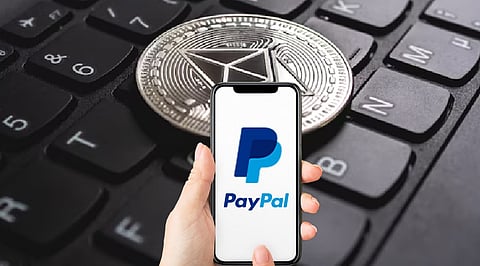Can you really buy Ether with PayPal? This question frequently arises among both crypto newcomers and seasoned traders as PayPal ventures further into the digital currency realm. Originally a straightforward online payment platform, PayPal has transformed into a significant player in cryptocurrency, offering direct services that simplify accessing Ethereum (ETH). However, not all methods are created equal. In this guide, we explore how to buy Ether using PayPal—whether through PayPal’s crypto features or as a funding source on trusted exchanges. We’ll also delve into fees and alternative options to help you make informed Ethereum purchases.
PayPal’s Role in Crypto: Direct vs. Indirect Purchases
PayPal offers two main avenues for entering the crypto world, and understanding the difference is crucial. The first is PayPal’s direct method, primarily available in the US, where users can buy, sell, and hold cryptocurrencies like Ether directly within their PayPal account. However, there’s a significant limitation: these currencies cannot be moved to external wallets or exchanges, limiting asset control.
The second method involves using PayPal as a payment source on external crypto exchanges. This approach is available globally, allowing users to fund their exchange accounts via PayPal and then purchase Ether. Unlike PayPal’s inbuilt service, this method typically offers full control over crypto assets, including withdrawals and transfers to external wallets.
Method #1: Buying Ether Directly Through PayPal
For those interested in buying Ether directly through PayPal, it’s essential to be in the right region. This feature is currently limited to select regions, mainly within the United States. Users must have a verified PayPal account and meet certain age and identity verification requirements. The process is straightforward: log in, navigate to the “Crypto” section, select Ether, choose the purchase amount, and confirm the transaction. However, crypto bought directly on PayPal cannot be transferred off the platform, and users face limited cryptocurrency options, potentially higher fees, and purchase limits.
Method #2: PayPal as a Payment Method on Crypto Exchanges
Using PayPal on a crypto exchange offers more flexibility. Here, PayPal acts like a bank transfer or credit card to deposit funds into your exchange account, which can then be used to buy Ether. The main advantage is full control over purchased Ether, allowing transfers to external wallets, staking, or trading for other cryptocurrencies.
When selecting a crypto exchange that accepts PayPal, consider security, reputation, fees, and user experience. Popular exchanges like Coinbase, eToro, and Binance P2P offer PayPal support, each with unique features and considerations. For instance, Coinbase is known for its regulatory compliance and security, while eToro offers social trading features. Peer-to-peer platforms like Binance P2P and Paxful provide diverse payment options but require caution to avoid scams.
Step-by-Step Guide: Buying Ether via an Exchange Using PayPal
To buy Ethereum with PayPal, start by selecting a reputable crypto exchange that supports PayPal payments. Consider security features, user reviews, and regulatory compliance. After signing up and verifying your identity, navigate to the payment methods section, select PayPal, and authorize the connection. Depending on the exchange, you may need to deposit funds before purchasing Ether. Confirm the order details, including fees, and complete the transaction.
For security, consider transferring your Ether to a personal wallet. Hardware wallets like Ledger or Trezor offer maximum protection, while software wallets provide convenience with solid security practices. This ensures full control over your assets.
Less Obvious Considerations When Using PayPal for Ether
Understanding the fee structure is crucial when buying Ether with PayPal. Direct purchases through PayPal incur transaction fees ranging from 1.5% to 2.3%, while third-party exchanges may charge higher fees due to PayPal’s processing costs. Additionally, network fees apply when transferring Ether to personal wallets.
Both PayPal and exchanges enforce purchase limits for security and compliance, which vary by user verification level and region. Cryptocurrency prices are volatile, so the final ETH amount may differ from the quoted price. Verify PayPal’s crypto services and exchange integrations in your region to avoid roadblocks.
Pros and Cons of Using PayPal for Ether Purchases
Buying Ether with PayPal offers convenience and speed, with a user-friendly interface and fast transactions. However, higher fees and limited control over assets are significant drawbacks. PayPal’s crypto services are not universally available, and strict terms of service may result in account freezes.
Alternatives to PayPal for Buying Ether
Bank transfers like ACH or SEPA are cost-effective alternatives, though slower. Debit or credit cards offer instant transactions but with higher fees. Other digital wallets like Apple Pay and Google Pay provide competitive fees and instant processing. P2P platforms offer flexibility but require caution to avoid fraud.
Ultimately, the best method for buying Ether depends on individual priorities. PayPal offers unmatched convenience, but other methods may provide lower costs or more control. Weigh these factors carefully and choose the approach that aligns with your goals and comfort level. Stay informed and practice responsible investing for a safer experience in the crypto world.





